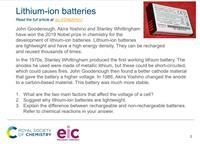Start a lesson with this summary slide and questions on the Nobel prize-winning chemistry involved in lithium-ion batteries
The 2019 Nobel prize for chemistry has been awarded to three scientists for their work on lithium-ion batteries. Without their discoveries, mobile phones and electric vehicles might never have made it into our hands and onto our roads.

The research that made such powerful, small and rechargeable power sources possible started 40 years ago. One of the trio, Stanley Whittingham started working on energy storage when the world faced an oil shortage. At the time, rechargeable batteries were heavy and toxic. In 1976, Stanley demonstrated the first rechargeable 2.5V lithium-ion battery, laying the foundations for today’s cells.
Put this in context
Find out about PhD researcher, Lizzie, who uses chemistry to research the best electrode materials for lithium- and sodium-ion batteries to improve their performance.
Read more about the Nobel prize-winning lithium-ion batteries in Chemistry World.
Downloads
Starter slide: Lithium-ion batteries Nobel prize 2019
PDF, Size 75.18 kbStarter slide: Lithium-ion batteries Nobel prize 2019
PowerPoint, Size 1.2 mb










No comments yet